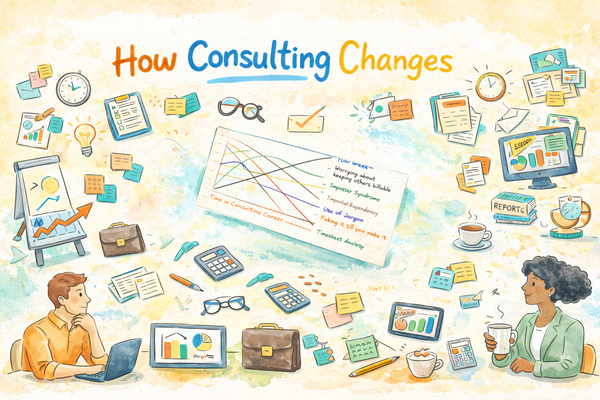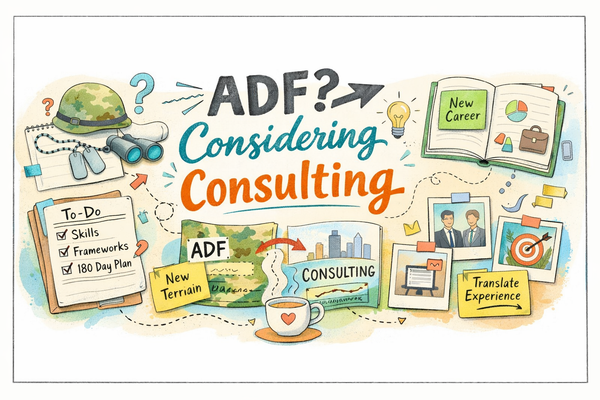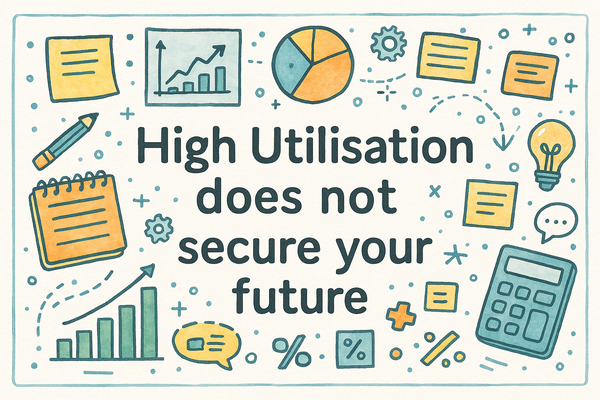When You're Asked to Deliver an Assignment You've Never Done Before....
If you wait until you feel qualified, you will miss the best work of your career. You will miss the best client moments, the best learning opportunities, and the best stories. You may miss your calling.

And what to do instead of panicking.
The first time I was asked to lead change management on a major government transformation, I thought my Partner was being wildly optimistic. In hindsight, he was just being commercially astute, but that’s another story tell another time.
I’d never done change management. I was hired to stand up a workforce planning practice. And if I’m being honest, I hadn’t done that either. It didn’t matter. I said yes. Not that I had much choice. Then I figured it out.
Taking on work you have never done before isn’t about faking it until you make it. Well, not entirely. It is about applying the consulting craft in a structured and deliberate way.
If you are early in your consulting career and a Partner or Director drops a complex assignment in your lap, don’t panic. Do this instead.

1. Know Your Superpower
Know what your consulting superpower is, even if it is not the one they asked for.
You might not have the topic experience, but you do have thinking experience. You know how to break a problem down, frame a hypothesis, test assumptions, and deliver something useful. That is more valuable to a client than you probably realise.
If you are a good listener, a structured thinker, and a decent human, you are already most of the way there.

2. Start With the End in Mind
Don’t wait to figure it all out before you start. Start with the end in mind. Work backwards by asking:
- What will this look like when it’s done?
- What decisions need to be made along the way?
- What would a dashboard show if you were making progress?
- What does success look like for the client?
Draw it. Write it. Validate it with the client early. That becomes your North Star. Use it to guide your questions, research, stakeholder interviews, drafts, and delivery.

3. Borrow Brilliance, Shamelessly
There’s always someone nearby who’s done something similar. Find them.
You don’t need to reinvent anything. Use your firms’ methods, frameworks, templates, case studies, and smart people. That’s what they’re there for. After all, they want to see you succeed too.
The best consultants aren’t original. They’re resourceful.

4. Use Hypothesis-Based Consulting Like a Pro
This is more than educated guessing. It is how consultants turn messy, ambiguous problems into progress quickly. At its core, it is the scientific method, the same process scientists have used for centuries to turn hunches into facts.
Start with a smart, logical starting point you can actually test. Not a wild shot in the dark. Then:
- List your working theories, no more than three.
- Test them in the real world. Run quick interviews, analyse existing data, ask sharp questions.
- Drop the dead ends fast. Don’t get attached to a bad idea.
- Double down on what works. Push deeper when you are on the right track.
The goal is not to be right from the start. The goal is to get to right faster than anyone else in the room.

5. Connect With Clients, Colleagues, and Your Community
These are my three Cs of consulting.
You are not alone. Consulting is not a solo sport. If you are in the deep end, speak up.
Book 20 minutes with someone who has done this before. Ask what good looks like. Ask what to avoid. Most senior people enjoy helping juniors who are thinking clearly and asking the right questions.
Ask your team the “dumb” questions. They are probably wondering the same thing.
Reach out to your community. Someone will know someone who can help.

6. Track the Small Wins
On complex projects, progress is often invisible. Make it visible.
Build a dashboard. Show what is moving. Even if no one asks for it, send a weekly or fortnightly status update to your client showing what you have done, what is next, and what decisions are needed.
This is not just good delivery hygiene. It is risk management. It becomes your record of progress, and if the project takes a turn, you will be glad you kept it.
It also makes performance reviews with your sponsor (Partner, Director or Counsellor) easier. When you can show your impact, people remember it.

Final Word
If you wait until you feel qualified, you will miss the best work of your career. You will miss the best client moments, the best learning opportunities, and the best stories. You may miss your calling.
Consulting is not about having the answer. It is about learning faster than the problem unfolds, and having the courage to keep going while you do it.
Were you ever thrown in the deep end on a consulting assignment? I would love to hear how you managed?





